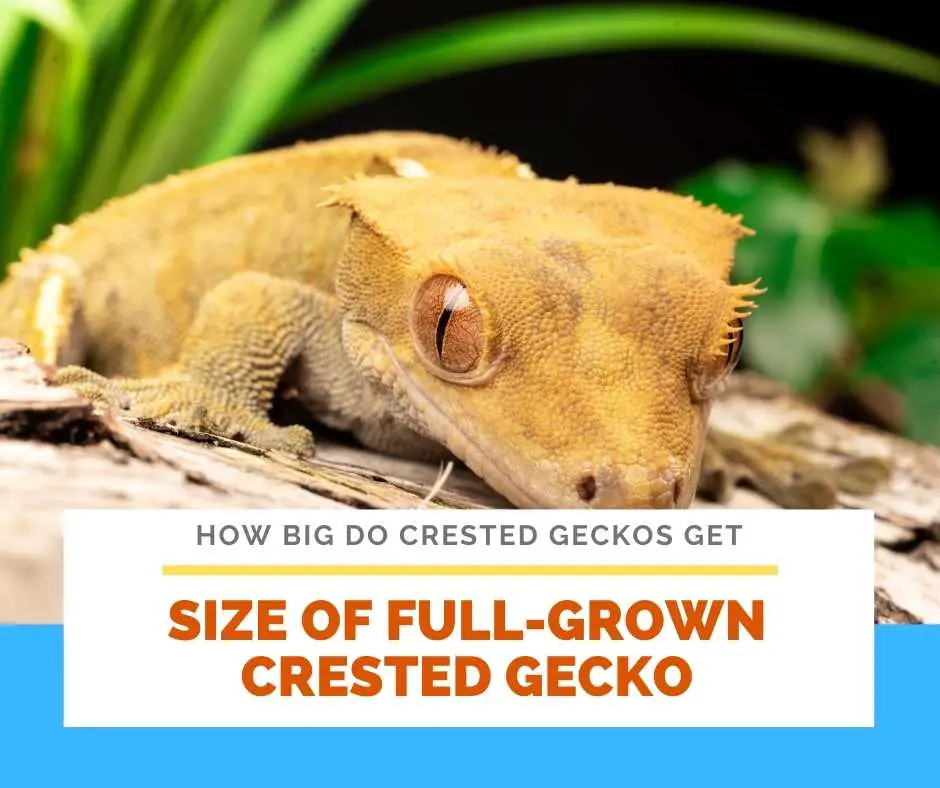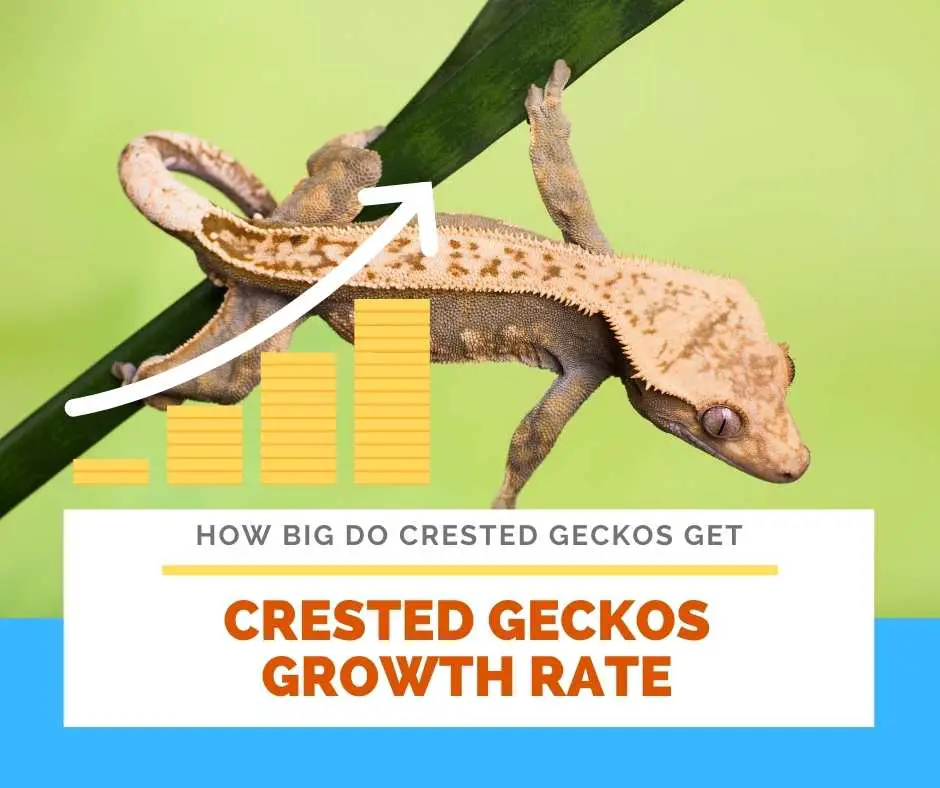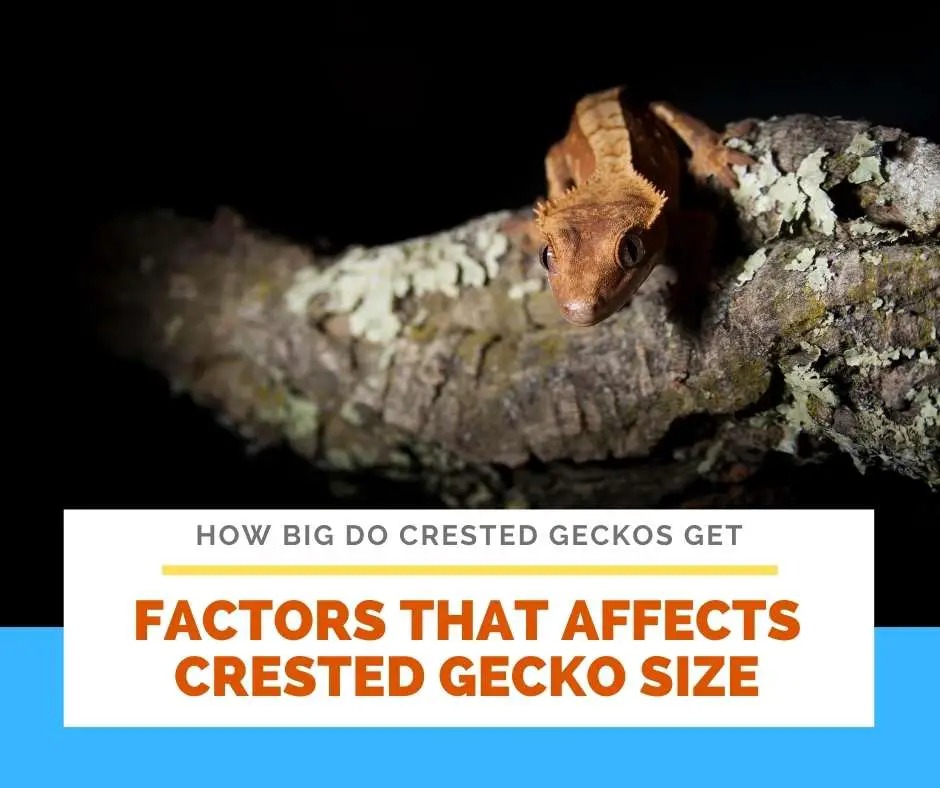Although most breeders estimated that it would take about 1-2 years for a baby to grow to an adult. However, crested geckos will grow at their rates. There are even times when it looks like crested geckos hatched and reared in a certain location are growing slower than others.
In this article, you will get to know more about the growth rate of crested geckos and how big they can grow.
Contents
Size Of Full-Grown Crested Gecko

The size of crested geckos can depend on the species. Some breeds of cresties can grow bigger than the others.
However, Crested geckos are moderate in size, and an adult can grow to about 8-10 inches in length. This includes the tail, which can be around 4 inches long. However, smaller geckos can grow to about 6-7 inches long.
Crested geckos size can also depend on their sex. This shows that male geckos are usually bigger (around 1-2 inches) than the female cresties. Mature female crested geckos can weigh around 25g while the male can weigh around 30-35g.
Crested Geckos Growth Rate

The growth rate of crested geckos in captivity is around 14-19 months from a baby to a fully grown adult. After hatching, baby cresties can measure 3-4 inches and weigh 2.5g.
However, different environments can affect the growth rate of crested geckos. Fluctuations in temperature and humidity will also have an impact on the growth rates of crested geckos.
Crested Gecko Growth Chart
| Gecko Age | Size |
| Hatchlings | About 2g |
| 3-month old | At least 3g |
| 6-month old | At least 5g |
| One-year-old | 8-30g |
| 1.5-3 year old | 40-55g |
New to crested gecko? Check out the crested gecko care sheet now! We had listed out all the things you need to know about crested gecko as pets. Check it now!
Factors That Affects Crested Gecko Size

Some of the things that can affect the growth rate of crested geckos are stated below.
Food
When crested geckos are fed with old school methods such as baby food and crickets, they can reach sexual maturity around a year. However, live food and sugar can cause an increase in the feeding response. Feeding with sugar can also cause obesity.
The main danger to crested geckos that grows too quickly with too little nutrients is MBD and several other health issues. It is best to feed your gecko with a crested gecko diet. However, it will take around two years for your gecko to reach adulthood.
Feeding crested geckos with insects can also increase their growth rate. However, not much information is known about what contributes to the rise in the growth rate.
If The Temperatures And Humidity In The Terrarium Are Not The Optimal Levels
The growth of your crested gecko will be affected if the temperature of their enclosure is too low. This is because low temperatures will affect the digestion, immunity, and energy levels of your gecko. These will then affect the appetite and general well-being of your gecko.
It is best to keep the ambient temperature of your crested gecko’s terrarium between 71-79 degrees Fahrenheit for optimal growth. However, you will need to heat their enclosure to get higher temperatures if your room is colder. This is because cresties kept in low temperatures have stunted growth.
Low humidity will also affect the appetite of your crested geckos. However, a very high humidity level can also cause bacterial and fungal growth, which will affect your crested geckos’ health.
The best humidity level suitable for crested gecko is 70% during the day. However, you should ensure it drops to about 50% a few hours a day to avoid bacterial and fungal growth. You can improve crested gecko’s tank humidity by misting the tank.
The Terrarium Of Your Crested Gecko Is Too Big
Crested gecko terrarium is among the top things that can determine the size of your crested gecko. You need to avoid housing a small crested gecko in a large terrarium, such as 15-30 gallons in size. It is best to keep small geckos in 3-6 gallon tanks until they weigh 15g.
This is because small crested geckos will grow faster if kept in a smaller enclosure. This is because it is easier for small crested geckos to find food and water without getting stressed in a small terrarium.
You can then move your cresties to 15-30 gallon terrarium once they grow to about 20g. You can then move your gecko to a larger terrarium once they become adults and will find it easier to move around.
However, when using a large terrarium, you can place two feeding spots in their tank to make it easier to find food.
Enclosure and Diet Changes
Many crested geckos will not eat when settling into a new home or making changes to their enclosures. This acclimatization period will last for about two weeks, but it can affect the growth rate for a short time.
During this period, avoid handling geckos too often. You should try to clean your gecko’s cage once a week. Although some people usually raise crested geckos communally in large enclosures, it is best to separate them into simple setups for optimal growth.
Furthermore, a change in diet will also affect the growth rate of crested geckos. It is best if you feed your gecko with a crested gecko diet. Because it provides a consistent and balanced food source that you can feed your gecko starting from the day you bring your gecko home.
New to crested gecko? Check out the crested gecko care sheet now! We had listed out all the things you need to know about crested gecko as pets. Check it now!
Genetics
The crested gecko’s parents’ size and growth history will determine whether a hatchling will have a slow or rapid development. This is why record keeping is important as it can shed more light on the growth rates of a crested gecko.
Parasites
Parasites in crested geckos can cause slow growth or no growth. This is because parasite infestation can cause health issues, which will also affect your cresties’ health.
It is best to be on the lookout for their stools, and you can check the fecal sample through a vet to determine if your crested gecko is infested with parasites.
The Crested Gecko Is Bullied
Crested geckos can easily get stressed if bullied by other cage mates. This is especially common in smaller geckos. It is recommended that you should not house two males geckos together.
Housing babies or juveniles cresties together can lead to slow growth. This is because a bullied crested gecko will be stressed up and will eat less. After hatchling, it is best to house baby gecko separately.
You may then house crested geckos together once they are adults. However, whenever you notice that they are aggressive to each other, you will need to separate them immediately.
However, keeping baby crested geckos in separate containers will help to boost their appetite and confidence.
Your Cresties Is A Slow Grower
You should keep in mind that even with good care, crested geckos will grow at their own rate. This means you do not have to worry if you are confident that your husbandry is ideal, and your cresties are eating properly.
Some cresties usually grow slower than the others. However, a sign that something is wrong with your crested gecko is if it is too small for its age. Your crested gecko is deemed too small if it weighs only 10g after 14-24months.
Conclusion

Knowing the crested gecko growth rate will help you prepare good husbandry that is ideal for optimal growth. It can take about 2-3 years for a gecko to reach an optimal weight between 35-55g.
